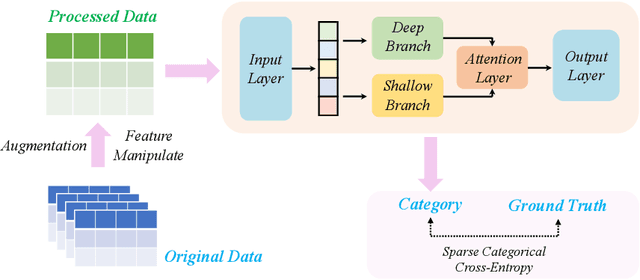Yanjun Cui
Glucose-ML: A collection of longitudinal diabetes datasets for development of robust AI solutions
Jul 18, 2025Abstract:Artificial intelligence (AI) algorithms are a critical part of state-of-the-art digital health technology for diabetes management. Yet, access to large high-quality datasets is creating barriers that impede development of robust AI solutions. To accelerate development of transparent, reproducible, and robust AI solutions, we present Glucose-ML, a collection of 10 publicly available diabetes datasets, released within the last 7 years (i.e., 2018 - 2025). The Glucose-ML collection comprises over 300,000 days of continuous glucose monitor (CGM) data with a total of 38 million glucose samples collected from 2500+ people across 4 countries. Participants include persons living with type 1 diabetes, type 2 diabetes, prediabetes, and no diabetes. To support researchers and innovators with using this rich collection of diabetes datasets, we present a comparative analysis to guide algorithm developers with data selection. Additionally, we conduct a case study for the task of blood glucose prediction - one of the most common AI tasks within the field. Through this case study, we provide a benchmark for short-term blood glucose prediction across all 10 publicly available diabetes datasets within the Glucose-ML collection. We show that the same algorithm can have significantly different prediction results when developed/evaluated with different datasets. Findings from this study are then used to inform recommendations for developing robust AI solutions within the diabetes or broader health domain. We provide direct links to each longitudinal diabetes dataset in the Glucose-ML collection and openly provide our code.
GluMarker: A Novel Predictive Modeling of Glycemic Control Through Digital Biomarkers
Apr 19, 2024



Abstract:The escalating prevalence of diabetes globally underscores the need for diabetes management. Recent research highlights the growing focus on digital biomarkers in diabetes management, with innovations in computational frameworks and noninvasive monitoring techniques using personalized glucose metrics. However, they predominantly focus on insulin dosing and specific glucose values, or with limited attention given to overall glycemic control. This leaves a gap in expanding the scope of digital biomarkers for overall glycemic control in diabetes management. To address such a research gap, we propose GluMarker -- an end-to-end framework for modeling digital biomarkers using broader factors sources to predict glycemic control. Through the assessment and refinement of various machine learning baselines, GluMarker achieves state-of-the-art on Anderson's dataset in predicting next-day glycemic control. Moreover, our research identifies key digital biomarkers for the next day's glycemic control prediction. These identified biomarkers are instrumental in illuminating the daily factors that influence glycemic management, offering vital insights for diabetes care.
Toward Short-Term Glucose Prediction Solely Based on CGM Time Series
Apr 18, 2024Abstract:The global diabetes epidemic highlights the importance of maintaining good glycemic control. Glucose prediction is a fundamental aspect of diabetes management, facilitating real-time decision-making. Recent research has introduced models focusing on long-term glucose trend prediction, which are unsuitable for real-time decision-making and result in delayed responses. Conversely, models designed to respond to immediate glucose level changes cannot analyze glucose variability comprehensively. Moreover, contemporary research generally integrates various physiological parameters (e.g. insulin doses, food intake, etc.), which inevitably raises data privacy concerns. To bridge such a research gap, we propose TimeGlu -- an end-to-end pipeline for short-term glucose prediction solely based on CGM time series data. We implement four baseline methods to conduct a comprehensive comparative analysis of the model's performance. Through extensive experiments on two contrasting datasets (CGM Glucose and Colas dataset), TimeGlu achieves state-of-the-art performance without the need for additional personal data from patients, providing effective guidance for real-world diabetic glucose management.
CrossGP: Cross-Day Glucose Prediction Excluding Physiological Information
Apr 16, 2024



Abstract:The increasing number of diabetic patients is a serious issue in society today, which has significant negative impacts on people's health and the country's financial expenditures. Because diabetes may develop into potential serious complications, early glucose prediction for diabetic patients is necessary for timely medical treatment. Existing glucose prediction methods typically utilize patients' private data (e.g. age, gender, ethnicity) and physiological parameters (e.g. blood pressure, heart rate) as reference features for glucose prediction, which inevitably leads to privacy protection concerns. Moreover, these models generally focus on either long-term (monthly-based) or short-term (minute-based) predictions. Long-term prediction methods are generally inaccurate because of the external uncertainties that can greatly affect the glucose values, while short-term ones fail to provide timely medical guidance. Based on the above issues, we propose CrossGP, a novel machine-learning framework for cross-day glucose prediction solely based on the patient's external activities without involving any physiological parameters. Meanwhile, we implement three baseline models for comparison. Extensive experiments on Anderson's dataset strongly demonstrate the superior performance of CrossGP and prove its potential for future real-life applications.
 Add to Chrome
Add to Chrome Add to Firefox
Add to Firefox Add to Edge
Add to Edge